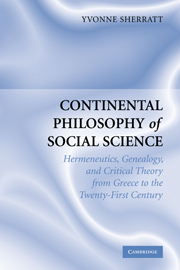Book contents
- Frontmatter
- Contents
- Preface
- Continental Philosophy of Social Science
- Introduction
- PART I THE TRADITION OF HERMENEUTICS
- PART II THE TRADITION OF GENEALOGY
- PART III CRITICAL THEORY
- Introduction
- 9 The History of Critical Theory
- 10 Critical Theory of the Early Frankfurt School
- 11 Innovations in Critical Theory: Adorno and Habermas
- Conclusion
- Bibliography
- Index
11 - Innovations in Critical Theory: Adorno and Habermas
Published online by Cambridge University Press: 23 November 2009
- Frontmatter
- Contents
- Preface
- Continental Philosophy of Social Science
- Introduction
- PART I THE TRADITION OF HERMENEUTICS
- PART II THE TRADITION OF GENEALOGY
- PART III CRITICAL THEORY
- Introduction
- 9 The History of Critical Theory
- 10 Critical Theory of the Early Frankfurt School
- 11 Innovations in Critical Theory: Adorno and Habermas
- Conclusion
- Bibliography
- Index
Summary
If Horkheimer viewed critical theory as twentieth-century Western society's source of redemption, Adorno looked for another solution. Theodor Weisengrund Adorno was born in Frankfurt am Main on 11 September 1903 to a family with exotic ancestral background, including a Corsican fencing master for a grandfather, from whom the name ‘Adorno’ derived. (His real family name being Weisengrund which, with its Jewish overtones, was substituted for ‘Adorno’ during his exile in the United States in order to avoid possible anti-Semitic prejudice). He was a precocious and intellectually formidable young man communicating with a variety of the most prestigious musical and philosophical minds of Twentieth Century Germany including Kracauer, Berg, Schoenberg, Benjamin, Brecht, Bloch, Horkheimer and later Mann, among others. Besides inspiring his musical talents, these intellectual friends and mentors spread the ideas of Kant, Hegel, Nietzsche, Marx and other canonical philosophers. During the rise of the Nazis in Germany, Adorno followed his Jewish colleagues into exile in 1934: he was but thirty-one years of age. In the United States, Adorno was exposed to a new culture, sociological research and his relationship with Horkheimer deepened. They co-authored Dialectic of Enlightenment, and Adorno penned many other key texts. He returned to Germany in 1949 and was finally recognised as an eminent public figure. His interests encompassed psychoanalysis, television research, analysis of horoscopes and prophecy, literary criticism, the making of radio broadcasts, the writing of many of his key philosophical texts including the Marxist-Idealist inspired epistemological study Negative Dialectics, and the aphoristic Minima Moralia which triumphed to become a best seller.
- Type
- Chapter
- Information
- Continental Philosophy of Social Science , pp. 210 - 221Publisher: Cambridge University PressPrint publication year: 2005



